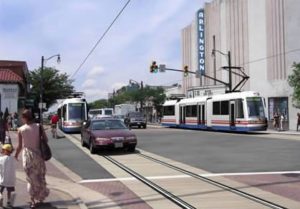 The Arlington County Board is considering options for having a private company design, build and run all or part of its planned streetcar system.
The Arlington County Board is considering options for having a private company design, build and run all or part of its planned streetcar system.
Earlier this month, the Board held a work session with officials from other North American transit agencies who spoke of their experience with public-private partnerships for light rail systems. By and large, said Board member and leading streetcar supporter Chris Zimmerman, those experiences were positive.
A public-private partnership “can save time and money,” he told ARLnow.com. ”We’re very seriously looking at the options.”
At the Nov. 15 work session, transit officials from Ottawa Denver, Minneapolis and Salt Lake City discussed both the positives and the risks, challenges and things didn’t work with their private partnerships. Such a partnership involves a contract between the local government and a private entity, with the company agreeing to design, build, operate and sometimes even finance the project — to the government’s specifications — in exchange for set payments.
The benefit for the public is that the company handles all the logistics — engineering, procurement, construction, etc. — and often can get more done with less money. The private company also has more flexibility to innovate and to accomplish goals.
In exchange for a long-term (30+ year) contract for operating the light rail system, the company agrees to certain performance benchmarks. The company and the government share some of the inherent risks in the project, instead of the government assuming all risk, like in a publicly-built system. In the end, the public retains ownership of the system.
“It’s pretty clear if you look around the world and increasingly around the county that things are moving that way,” Zimmerman said. He cited the experience of Vancouver, which was able to build a two-track light rail system through a public-private partnership for the same cost as it had budgeted to build a one-track system on its own.
Zimmerman said a public-private partnership is especially attractive for the county’s planned Crystal City streetcar, which will be funded using a TIF — tax increment financing, derived from gains in commercial real estate values in Crystal City.
“[Crystal City] might be very well poised for this kind of approach,” he said.
It’s possible that the Columbia Pike streetcar could be built using a public-private partnership, but it’s less likely since the county is seeking federal funds for the project and since it is further along in the process.
Zimmerman said the county hopes to have the Columbia Pike streetcar up and running sometime between 2017 and 2018, and the Crystal City streetcar operating between 2018 and 2019. The construction process for each will take about two years.
At its meeting Tuesday night, the County Board deferred consideration of a measure that would allow the county to pursue public-private partnerships under a 1995 Virginia law. The Board will take the matter back up at its December meeting, after Board members Libby Garvey and Walter Tejada expressed some reservations about the method by which the county will award such contracts.
Also on Tuesday, Board Chair Mary Hynes said the county expects to hear back from the Federal Transit Administration regarding federal funding for the Columbia Pike streetcar at some point in the first half of 2013. Zimmerman said he’s reasonably confident the project will move on the the next stage of the FTA’s funding process, but was concerned that federal funds might be hard to come by in light of proposed budget cuts.
“We think the project should score pretty well using the criteria that the federal government is using,” he said. “Obviously we’d be more confident if there was more funding.”







